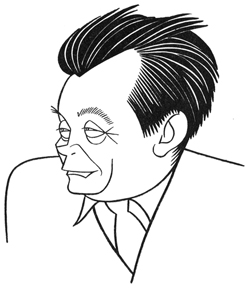In this chapter from his 1932 book, Times Square Tintypes, Broadway columnist Sidney Skolsky profiles Samuel Shipman, a playwright of some prominence in the first half of the twentieth century.
NO MAN IS A HERO TO HIS VALET
 SAMUEL SHIPMAN. When he was graduated from Columbia this line appeared under his picture in the college book: “God Makes Some Strange Things.”
SAMUEL SHIPMAN. When he was graduated from Columbia this line appeared under his picture in the college book: “God Makes Some Strange Things.”His first play, which he wrote at the age of twelve, was something called Justice. It was performed at the Jewish Educational Alliance.
He is marvelously unkempt. Even after he has had a shave and a haircut he needs a shave and a haircut.
As a kid he wore phony jewelry to appear rich.
Writes all his plays in Atlantic City. He engages a suite in one of the exclusive hotels. He always takes two stenographers an a collaborator with him. He dictates everything he writes. Paces the floor and is often in another room shouting the lines. The stenographers work in relays, one resting while the other is taking the dictation.
He never sleeps more than four hours a day. And always one of these hours is between five and six in the morning.
He made a million dollars in royalties from Friendly Enemies and East Is West. So did Wall Street.
Likes to drink and play with tea. Is always pouring the tea from the glass to the saucer and then back into the glass.
Has only one superstition. That is he must start an finish his plays on a Tuesday. It doesn’t matter if the Tuesdays are months apart.
He once taught English in an East Side school.
Everything he does he describes as “terrific.”
Has only one superstition: that is, theatrical notables. Eugene O’Neill, for example, he believes is only an intellectualized Theodore Kremer. Claims the only thing he likes about George Jean Nathan is H. L. Mencken. A. H. Woods is his favorite producer. Because whenever he hands that impresario a flop Woods never cries, but merely says: “It’s all right, sweetheart; try again.”
He rarely eats meat. His favorite meal is one composed solely of caviar.
Likes to go prowling about the city at night and often sets out at midnight, alone.
The sight of fish fascinates him. He is a frequent visitor at the Aquarium.
He never hangs up anything. His clothes are sprawled about the house. On entering he tosses his hat anywhere. His coat is dropped on the living room floor; the vest on the bedroom floor. His trousers he carefully places at the foot of his bed. He dresses faster than a fireman.
To date he has had twelve collaborators. His favorite is John B. Hymer because Hymer understands him.
He wants to know everything before anyone else.
Never reads a book during the winter. Every summer he goes for a vacation in the Catskill Mountains, taking two valises full of books with him.
Doesn’t like young girls. Never goes out with a lady under thirty-five.
Never falls in love with an actress. His sweetheart is a nonprofessional. Her parents, however, dislike everything connected with the theater and won’t allow him in the house.
His ambition in life is to write the libretto of an opera and to have it presented at the Metropolitan Opera House.
He suffers from indigestion. His secretary carries his pills and reminds him when he has indigestion.
At Columbia he studied playwriting under Brander Matthews, who gave him a C minus. He asked that his mark be raised and Matthews asked why. Shipman then pulled out a contract for a play he had just sold. Matthews merely replied: “It’s the old story. Theory is theory and practice is practice.”
He covered the Ruth Snyder case for a tabloid newspaper.
Never cleans his shoes on the outside, but only inside. This, he claims, is healthy for the feet.
He can recite most of Ibsen’s plays from memory. While writing a play his teeth become loose; in fact, so loose that he can pluck them. To date he has plucked six. The minute the play is finished his teeth tighten. He is continually visiting dentists because of this condition.
The greatest disappointment one can get in life, he believes, is meeting somebody one had heard a lot about.
One evening at the Lambs Club Eugene O’Neill was playing poker with a group of playwrights. After losing all his money O’Neill offered to play on his ability as a dramatist. After another hour of heavy losing O’Neill got up and started for home. As he was leaving the doorman said: “Good night, Mr. Shipman.”
The only time he ever combs his hair is before going to bed.

